AMD Ryzen 7 2700 Review: The Non-X Factor
Why you can trust Tom's Hardware
Final Analysis
AMD's Ryzen 7 2700 boasts many of the same features as the flagship 2700X, including an eight-core architecture and 16MB of L3 cache. But it loses quite a bit of steam in our benchmarks due to its lower clock rates. Overclockers can get comparable performance out of both CPUs, but they need to replace the stock heat sink and fan with higher-end aftermarket cooling first. This sullies any value advantage the 2700 might have enjoyed.
How does a frequency disadvantage affect the 2700's viability in a gaming PC versus AMD's Ryzen 7 2700X? The charts below plot performance using average frame rates and a geometric mean of the 99th percentile frame times (a good indicator of smoothness), which we then convert into a FPS measurement. We also present price-to-performance charts that get split up to include CPUs-only and extra platform costs. For the models that don't come with a bundled cooler, we add an extra $25 for a basic heat sink. We also add $20 if overclocking requires a more expensive motherboard (as is the case for Z370).
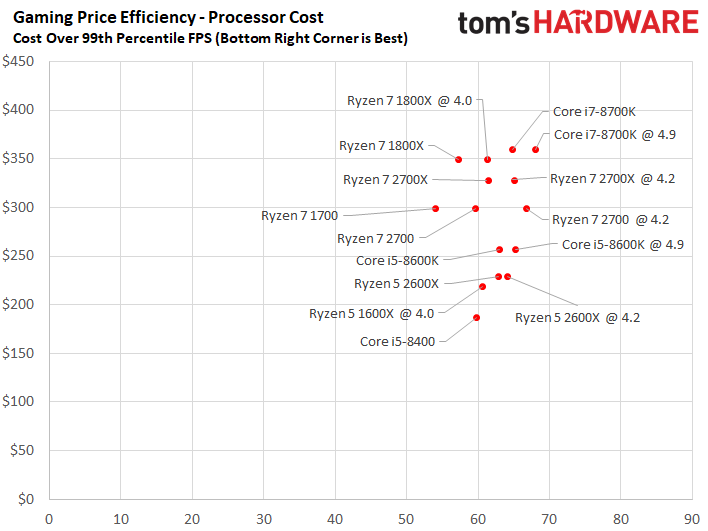
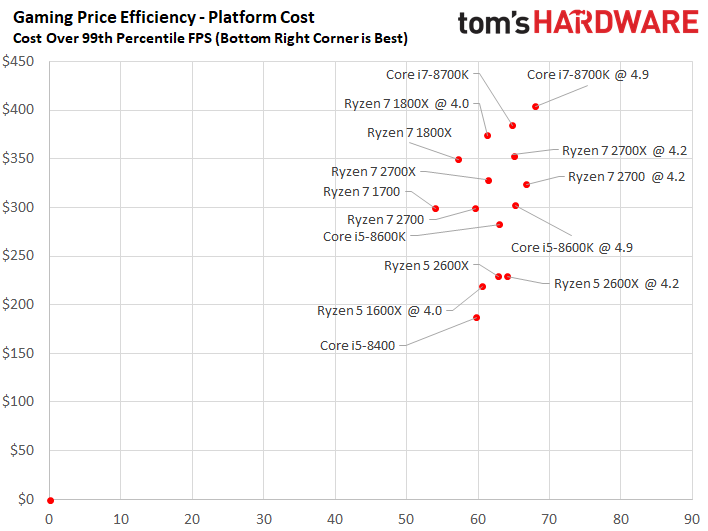
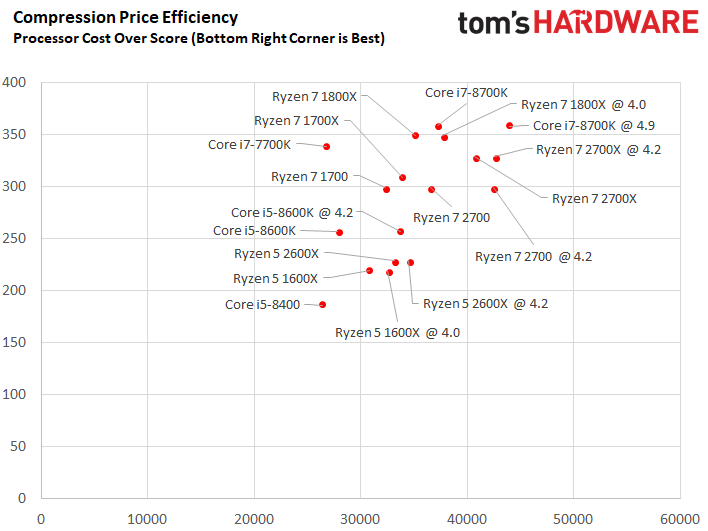
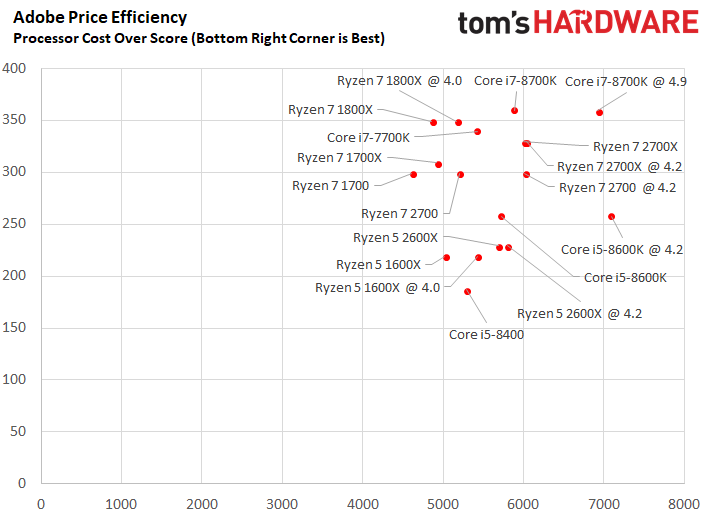
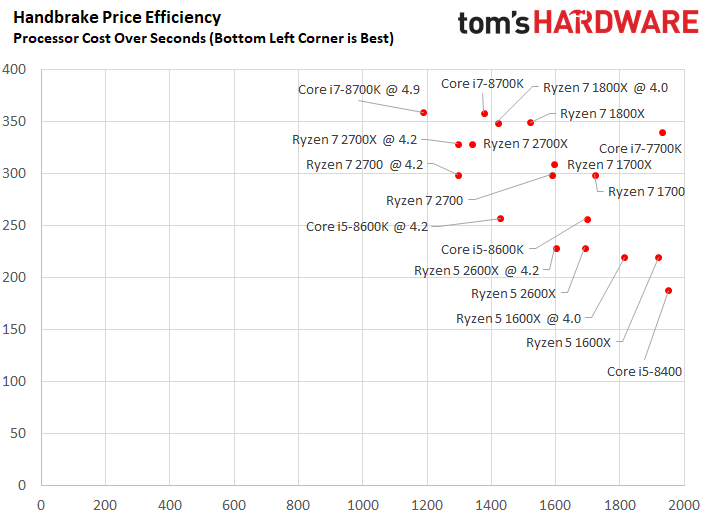
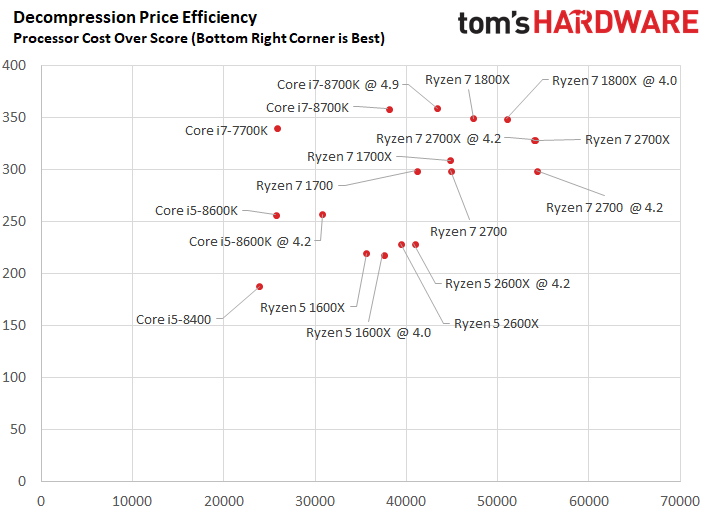
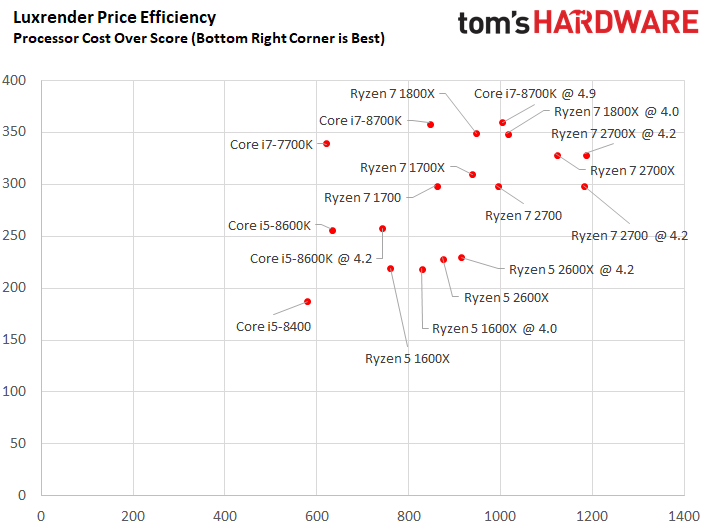
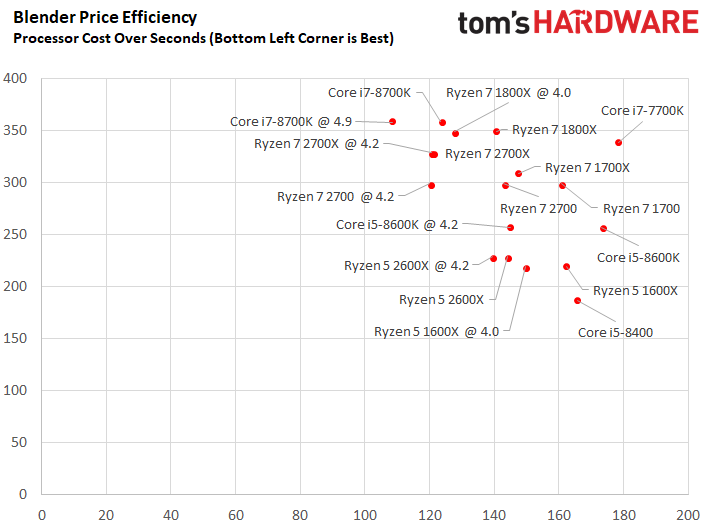
When it comes to gaming, an overclocked Ryzen 7 2700 provided a statistically insignificant ~1 FPS advantage over the 2700X in 99th percentile frame rates. In essence, both tuned processors offer a very similar experience through our suite. It's unfortunate, then, that you need to buy an aftermarket cooler in order to overclock Ryzen 7 2700 to its potential. So much for the $30 savings versus Ryzen 7 2700X.
That means you get more value from AMD's flagship than the stepped-down Ryzen 7 2700. In fact, at stock settings, even a Core i5-8400 is roughly equivalent to the 2700. And it costs $110 less. And you can drop it into affordable motherboards. Intel's stock cooler is fine, too. You get the picture.
Similar trends surfaced in our desktop productivity tests. Ryzen 7 2700's frequency deficit resulted in notably less performance than a stock Ryzen 7 2700X across the board. Although Ryzen 7 2700 is faster than Intel's Core i5-8400 and -8600K in threaded workloads thanks to its eight-core design, AMD's own Ryzen 7 2700X is more compelling if you're interested in those types of applications.
If you tune the memory, the Ryzen 7 2700X doesn't gain much from overclocking the cores. That means you can pair the 2700X and its stock cooler with a capable memory kit and get impressive performance. In contrast, you'll have to invest in a more capable cooler to achieve the same level of performance with the Ryzen 7 2700. That largely negates the 2700's scant $30 price advantage.
Gone are the days of AMD selling its X-series Ryzen CPUs at higher prices and without thermal solutions. Newer models like the Ryzen 7 2700X only cost a bit more than the 2700, plus they also include a heat sink and fan. We'd rather spend the extra $30. Of course, gamers might want to go another direction. Intel's Core i5-8400 costs less and is every bit as quick in our favorite titles. And then there's the Ryzen 5 2600X, which is surprisingly fast across a broader range of workloads and much more affordable.
Get Tom's Hardware's best news and in-depth reviews, straight to your inbox.
MORE: Best CPUs
MORE: Intel & AMD Processor Hierarchy
MORE: All CPUs Content

Paul Alcorn is the Editor-in-Chief for Tom's Hardware US. He also writes news and reviews on CPUs, storage, and enterprise hardware.
-
rantoc @1440p or 4k the gaming difference wont be noticeable as the gpu starts to become the bottleneck. Game with an 2700x on an 3440x1440 100hz display (1080ti) and couldn't be happier as it also have the benefits of chewing through threaded workloads like a champ and that at a good price. So good mid-high res gaming with very good threaded performance, hard to beat really.Reply -
philipemaciel I am going to buy the 2700.Reply
The 65W TDP is low enough for passive cooling. That it is cheaper than the 2700X is just the icing on the cake.
For *my* needs, it is perfect. I am more than happy to lose a little performance and have the TDP drop 40W. -
mitch074 I think @philipemaciel hit it right on the head: the 2700 is a much better choice if you're looking for a powerful CPU that sips power (65W is damn impressive, and that's before taking into account the possibilities offered by undervolting), as this puts it in a spot both the 2700X and the 2600X can't touch. For pure gaming, the 2600X is a much more sensible choice, and if you need absolute power without the need to tinker with it, the 2700X is perfect (an 8-core CPU that overclocks itself, it's a dream come true).Reply
Now though, it would have been better if AMD had sold those without a cooler for $20 less - the price gap with 2700X would have made it much more enticing, and overclockers could have pushed the hell out of it with watercooling etc. -
redgarl You rated that 6/10? Are you mad? Also, the stock cooler is not sufficient for Overclocking? Do you realize that this is the case for all marketed CPUs?Reply
OMG, YOU GUYS ARE GENIUSES! -
theyeti87 Reply20974031 said:I am going to buy the 2700.
The 65W TDP is low enough for passive cooling. That it is cheaper than the 2700X is just the icing on the cake.
For *my* needs, it is perfect. I am more than happy to lose a little performance and have the TDP drop 40W.
Your reasoning is the same logic I used in selecting my 1700 non-X. I am attracted to efficient power. -
Paul Alcorn Reply20974322 said:"...our 4.0V Vcore, 1.2V SoC"
That's a LOT of vcore right there!
Thanks, good eye! fixed. (1.4V) -
LORD_ORION I would expect the 2700 to have longevity.Reply
NeoHome economics 101: Buy quality parts that/and don't push the hardware limits.
Main System(5-7 years) becomes Utility System(5+ years)
Repeat
Unless of course you burn out the mainsystem in 3-4 years *factory overclocks tend to do this too). ;) -
Garrek99 The point of this processor is power efficiency not performance.Reply
Where are the performance per Watt or Temp charts? -
ElectrO_90 You do realise, the whole point is to sell the 2700 for $30 so they can sell the main 2700x, because people don't mind spending 10% more, unless they are really restricted for power/heat.Reply